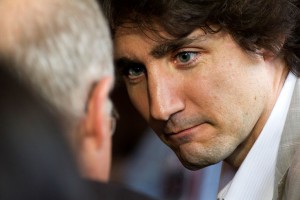Trudeau has a lengthy road ahead

It has been roughly six months since Justin Trudeau became the leader of the Liberal Party of Canada. The party that he assumed control of was one in transition.
The Liberals came in third place in the 2011 federal election. It is a position they have never been in before, having either formed the government
or official opposition since Confederation.
Since then, Trudeau has tried to establish himself as a distinct alternative to Stephen Harper’s Conservatives and Thomas Mulcair’s NDP. He believes that the way the Conservatives conduct their politics is leading the country in a dangerous direction.
The recent record of the Conservatives would suggest that there is merit to this idea.
In the last year, the Tories have been afflicted by the Senate spending scandals, the F-35 fighter jet procurement debacle, and Prime Minister Harper’s rather tight leash over his own MPs, among other things.
Trudeau has explicated his belief that on too many occasions, Harper’s Conservatives have acted beyond the pale. A message to supporters on his website proclaims that “We need a vision for our future grounded not in the politics of envy or mistrust.”
One of his greatest challenges will be establishing an identity for his party that doesn’t rely heavily on comparisons to the Conservatives or the NDP. It will not be enough for him to merely state that the Liberals will govern differently.
In the last couple of years, a favourite topic of conversation for many politicians has been the middle class.
Trudeau has spent a fair amount of time outlining his belief that the economic issues surrounding the middle class will be one of the defining areas of concern in the next election, and he very well could be right.
The Conservatives were able to obtain a majority by targeting voters in suburban ridings, many of which are comprised of people generally considered to be members of the middle class.
The number of people in Canada living in suburbs is expected to increase in the next few years. Success in the forthcoming 2015 election may depend largely on which party can appeal to the most to suburban voters.
Another subject that Trudeau has focused on is the debate surrounding marijuana. In July, he came out in favour of full legalization during a stop in Kelowna.
In August, he admitted to having smoked it while in office. Both of these occurrences have foisted the issue back into the limelight of public debate.
Both the economy and the marijuana legalization debate will play a role in the Liberal’s 2015 election platform.
One of the major problems with Trudeau’s track record as leader so far, however, is that he has focused almost too much on those particular topics.
Critics contend that he lacks experience and solid policy credentials. Problematically, he announced at a rally towards the end of August in P.E.I. that he will not be releasing any major details of a potential platform until 2015.
It should be pointed out that Trudeau has made some effort to burnish his team’s policy development. He recently hired retired Army general Andrew Leslie as an adviser on international affairs, and brought on respected journalist Chrystia Freeland as an economic adviser.
In the last few weeks, Trudeau has maintained that it takes time to develop a good platform, and that he will not rush the process.
Instead, he will spend time in the next two years working with his team, and consulting everyday Canadians, as he constructs what he hopes to be a platform that can help the Liberals beat the Conservatives in 2015.
Trudeau’s decision not to release major policy details until 2015 is understandable, but also disappointing.
Establishing his party as a viable alternative to the NDP and Conservatives will require providing clear and practical ideas for problems that we face in healthcare and the environment.
Platitudes and clichés used to describe the adverse conditions of the middle class will have to be replaced with cogent and innovative policy strategies for tackling the problems of our economy.
Canadians deserve to have their interests in public life reinvigorated, and will respond to whatever party decides to begin the process. Justin Trudeau has indicated that he’s ready to bring something new to the table.
Before Canadians will join him there, though, he’ll have to give them some more food for thought.

